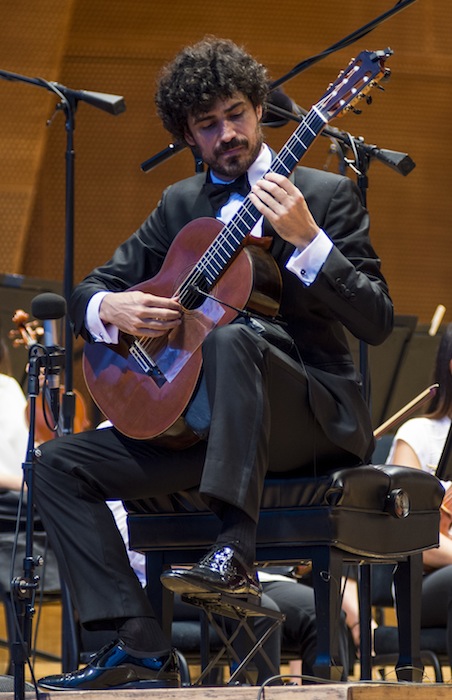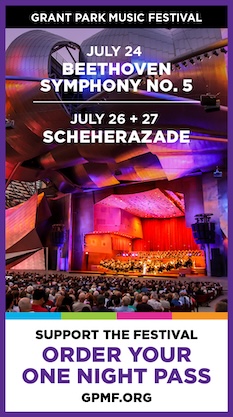Villegas and Kalmar bring Spanish flair to Grant Park program

As usual, Carlos Kalmar got it right with both his spoken commentary and his conducting Wednesday night at a concert of mostly Spanish music by the Grant Park Orchestra.
Funny, he said, how you can’t seem to have a concert of classical music focused on Spain without throwing France into the mix. So many notable French composers used Spanish harmonies and rhythms, he told the large throng at the Pritzker Pavilion, and some of Spain’s best-known composers studied music in France. Kalmar’s Spanish-loving Frenchman of choice Wednesday night was Bizet, represented by a suite from his opera Carmen, and all three of the program’s Spanish composers–Juan Crisostomo Arriaga, Joaquin Rodrigo and Joaquin Turina—studied or worked in Paris.
The concert’s happy discovery was the Grant Park debut of Spanish guitarist Pablo Sainz Villegas, featured in Rodrigo’s Fantasia para un gentilhombre and a stunningly fiery solo encore, Francisco Tarrega’s popular Gran Jota.
Rodrigo wrote his atmospheric Fantasia in 1954 for Andres Segovia, who established the guitar’s reputation as an important classical instrument. Villegas, now 40 and a Segovia Award winner at age 15, played it with astonishingly nuanced color as well as impeccable technique.
In the gently melancholy opening theme that recurred throughout the four-movement work, Villegas’s guitar took on a dark, richly grained low timbre. Expertly amplified, it was a completely equal partner to the expressive Grant Park Orchestra. In the opening movement, orchestra and soloist held a graceful conversation, seamlessly passing the theme between themselves. In the second movement, solo woodwinds drifted in and out like friendly phantoms over Villegas’s brooding, dreamy guitar.
Kalmar explored every corner of Rodrigo’s wide emotional palette, and the third movement bubbled with energy, evoking the joyful nobility of a Renaissance-era courtly dance.
The cheering audience wanted more, and Villegas unleashed his breathtaking virtuosity in Tarrega’s Gran Jota. Deploying the guitarist’s toolbox of fingers on strings, he turned his instrument into everything from a raspy, blindingly fast snare drum to a quasi-orchestra capable of embellishing a strong, steady melody with deliriously intricate ornaments.
The concert opened in genial fashion with the overture to Arriaga’s opera, Los Esclavos Felices (The Happy Slaves), written in 1820 when the composer was 13. Its sunny but aristocratic high spirits brought Mozart to mind, and Kalmar and his musicians gave it a crisp, elegant reading.
In his three-part Danzas Fantasticas from 1920, Turina occasionally sank into the fulsome, overstated emotionalism that would become typical of 1950s big-screen movies. But the orchestra reveled in music’s kaleidoscopic colors, both its ominous shadows and lilting romanticism.
The Carmen suite, the most familiar piece on Wednesday’s program, was surprisingly bland. Kalmar set a blistering pace in several sections, certainly catching the momentum of Bizet’s characters swept up in a headlong, lust-driven rush. Despite vividly precise phrasing from the orchestra’s strings and woodwinds, the speed and unvarying tempos skimmed the emotional surface of the music. In the suite’s languorous moments like the Seguidilla, especially, we had little sense of a seductive, wily Carmen stalking her prey.
Virtually non-stop, screaming sirens throughout the Carmen music didn’t help. With streets closed for the Lollapalooza marathon this weekend and a major soccer game at Soldier Field, downtown was especially noisy.
Posted in Performances
